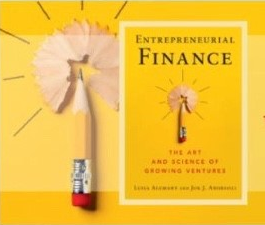For these experts, the incentive to contribute was as much to service their own needs as those of entrepreneurs and investors, says Dr Alemany.
“We all felt we had to write this book for the European startup scene, but also because we needed it ourselves, to teach. It’s the resource that every contributor has been wanting to have for a long time. As part of the long publishing process, Cambridge University Press invited a selection of 12 blind reviewers – faculty of entrepreneurship – to come in and do a review of an example chapter. Straight away, 11 of them told us they wanted this book tomorrow!”
Entrepreneurial Finance: The Art and Science of Growing Ventures has value for every player in the startup finance scene in Europe. The book is purposefully crafted and enriched with case studies and anecdotes to provide essential insights not just for entrepreneurs, investors and scholars, but also for all those involved in the process of financing new ventures, such as lawyers, consultants, auditors, investment bankers and policy-makers, Dr Alemany says.
It is organised into successive chapters that cover funding sources and processes, through to growing the venture, monitoring, corporate governance and managing intellectual property. Section Four explores “alternative” routes to finance, including acquisitions, turnarounds and workouts, and impact investing. The final part looks at exiting and the harvesting strategy, and closes with a meditation on the future of entrepreneurial finance – and this is a space, she adds, in a state of continuous evolution.

“That’s the thing that makes entrepreneurial finance so very exciting. It’s just evolving all the time. Regulations evolve, so too do sources of finance. Increasingly we are seeing entrepreneurs doing things like direct listing – doing their own IPOs. Then you have the growing trend of ‘super angels’ competing with venture capital or large rounds of financing coming from crowdfunding. And we are still to see the impact of new technologies like Blockchain and crypto. It’s a constantly changing space.”
Dr Alemany acknowledges that there is a challenge in writing a definitive textbook – one capable of encapsulating such a very dynamic space for any length of time.
“Clearly, we will need to update the book as necessary, and that’s something that Job and I have very much on our radar. But this isn’t a problem, really. I think that the thing that defines your work as an academic is the way that different aspects of what you do overlap and complement each other. Your research, your teaching and your writing, all of these dimensions feed into and enrich each other. If my purview is to understand what’s happening in entrepreneurial finance, then all the work that I do, including the book writing and publishing new case studies in the topic, creates a kind of virtuous circle of investigation that keeps on enriching itself.”
Besides future updates, Dr Alemany and Andreoli are also keen to service other geographies.
An edition looking at Asia – and venture capital is China in particular – is planned for release later this year. And a future edition focused on Latin America is in the works. These are resources needed just as acutely as the European publication, says Dr Alemany. And exciting new ventures for herself and for her co-author.
“With this first book we identified the opportunity, scouted out the market and put together the resources and processes. The experience of writing has given us the insights, expertise and knowledge, as well as that feeling of resilience that is such a fundamental part of the entrepreneurial mindset. It will be exciting to put all this to test again in new markets that are growing rapidly in the financing of new ventures.”
Entrepreneurial Finance: The Art and Science of Growing Ventures by Dr Luisa Alemany and Job J Andreoli is published by Cambridge University Press.










